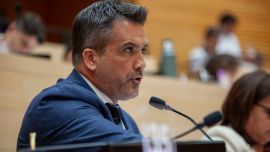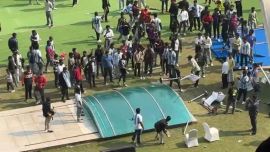It is a future nobody particularly wishes to consider, yet one that has been glimpsed before in his darkest hours and which one day will arrive. Lionel Messi at some point will have to hang up his boots and put an end to his glorious career with Argentina – where, then, will that leave the current world champions?
Messi himself this time took charge of dampening the growing expectation that, defying the inexorable passage of time like the wizard he is, the Albiceleste number 10 would be ready and raring to go on the eve of his 39th birthday to lead his nation once more into World Cup battle in 2026.
“I have actually said it several times, I don't think so, I think that this was my last World Cup,” he told reporters in China last week, though he could not resisting leaving a shred of hope on which to cling still: “I will see how thing go, but at the moment I don't think I'll make it.”
A few clues to what that Leo-less future might look like were also on offer over the past week. Beijing bore witness to his latest moment of magic in Argentina colours, a stunning strike from outside the area eighty seconds into last Thursday's friendly meeting against Australia which put Lionel Scaloni's charges on the way to a repeat of their World Cup last-16 victory, this time by a scoreline of 2-0.
The captain then sat out the second leg of the Albiceleste's Asian tour, accompanied throughout by a frenzy of fan activity charged, inevitably, by the new Inter Miami signing's overwhelming star power.
In his absence it was left to mostly familiar faces and a few new promises to steady the ship, and steady is about the best word for it: goals either side of half-time from Leandro Paredes and Cristian Romero secured victory over Indonesia but it was hardly the resounding win most would have expected over a country far from the elite of international football.
Brighton teenager Facundo Buonanotte was at least a welcome surprise as he enjoyed an impressive full debut; but most eyes, particularly in Argentina and England, were fixed on a young star who played off the bench in both games, Alejandro Garnacho.
Still just 18 years old and with fewer than 40 senior appearances under his belt, Garnacho nevertheless is fated to carry the weight of expectation. Because, despite his Spanish birth and father, he chose his mother and Argentina. Because even as a teenager he has shown enough with Premier League giants Manchester United to forecast a glittering career ahead. Because everything about the young man suggests that he can be a brash, fearless standard-bearer for Argentina both on and off the pitch. And for precisely those reasons, he, Scaloni and everyone connected with the national team will have to be doubly guarded against raising hopes, as Messi himself knows better than most.
For there was a time when Messi was not Messi, but to a dreaming populace the heir to folk legend Diego Maradona. He was not the first. Before him the likes of Ariel Ortega, Juan Román Riquelme, Pablo Aimar, Andrés D'Alessandro and even Middlesbrough favourite Carlos Marinelli all laboured in the shadow cast by the New Maradona tag, and while many went on to enjoy sterling careers in their own right, that legacy proved impossible to fulfil. The result was years of disappointment and frustration that dogged the national team as a whole generation of talent proved incapable of living up to the great man and his achievements.
That past experience, then, makes it all the more important not to repeat the same errors when the moment we are all dreading finally occurs. Garnacho, Buonanotte and any new Argentina stars that emerge must be judged on their own merits and not in comparison to an extra-terrestrial the likes of which we may never see again gracing a football pitch.
Messi is irreplaceable, but with any luck the collective spirit and unity he has helped foster in the Albiceleste will ensure that the glory days will continue long after he decides he has achieved all he can in a sport he has dominated for the past two decades.




















Comments